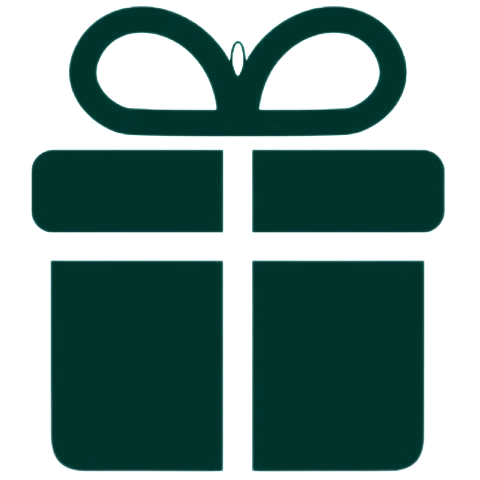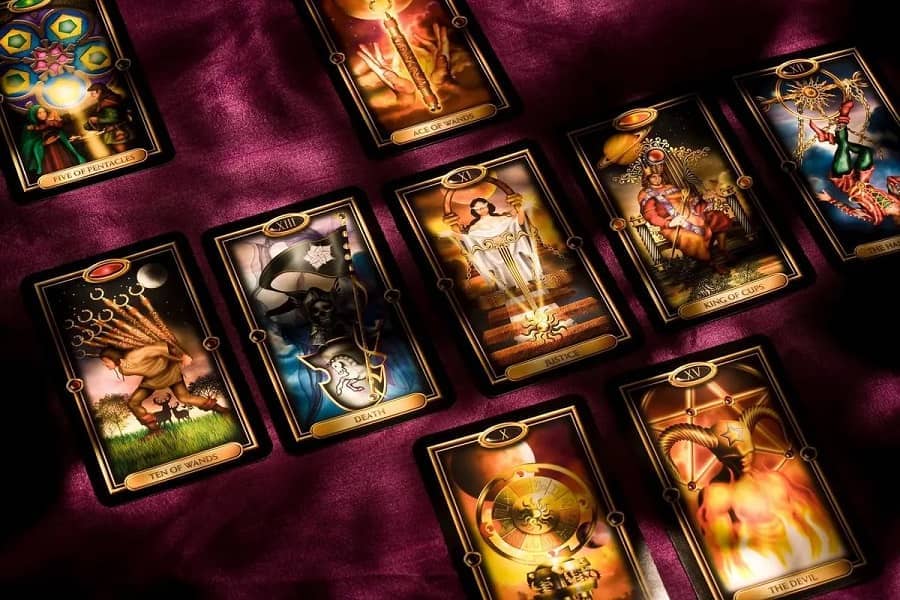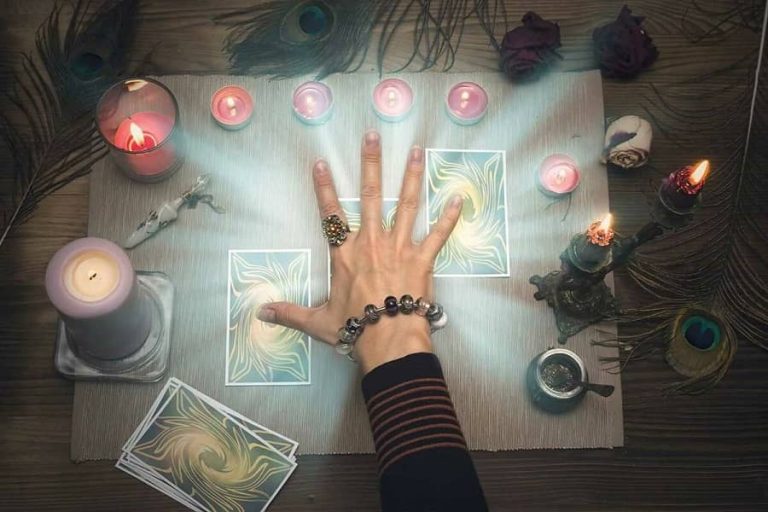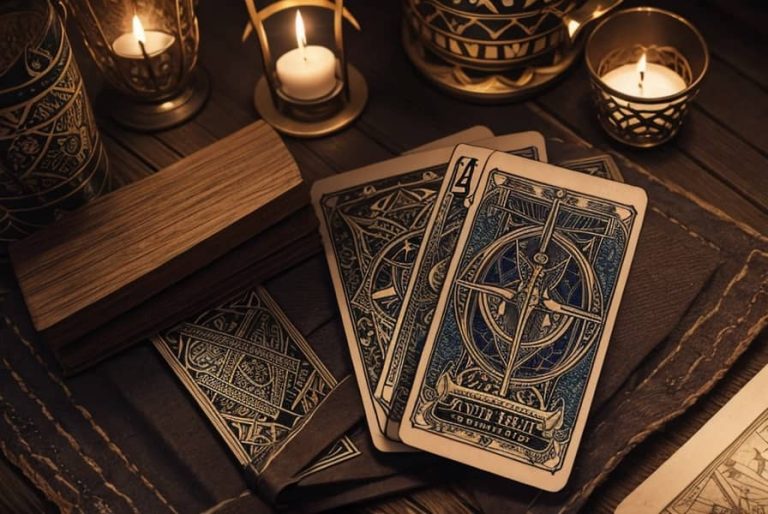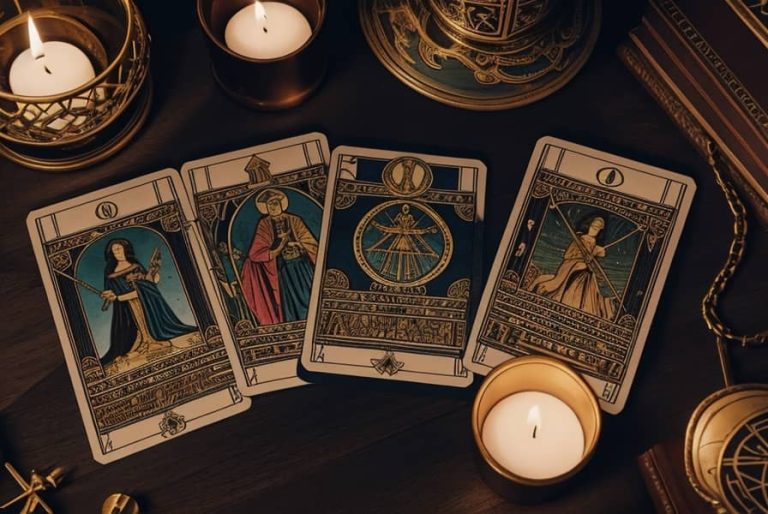Can Tarot Cards Ruin Your Life? A Rational Perspective
Tarot cards have intrigued and captivated individuals for centuries, invoking a sense of mysticism and divine guidance. However, there are concerns about the potential negative impact tarot cards may have on one’s life. In this article, we will delve into the concept of tarot cards and explore how a rational interpretation can prevent them from causing harm in your life.
I. Understanding Tarot Cards
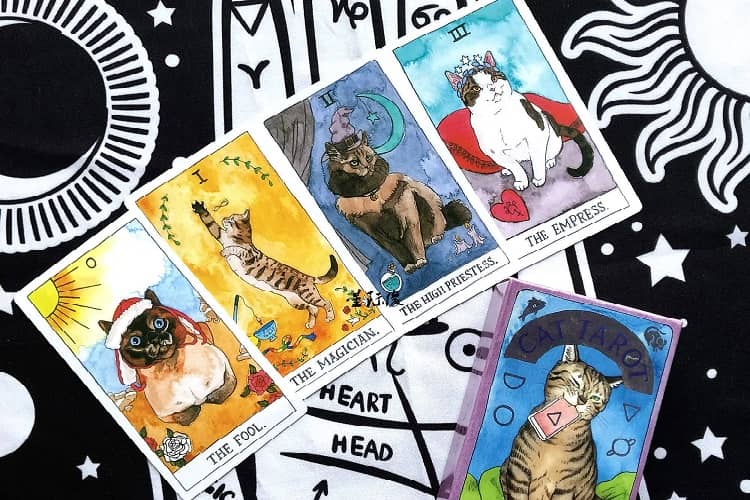
Historical Background: The origins of tarot cards can be traced back to ancient civilizations, including Egypt and China. While the exact origins are debated, the earliest known decks emerged in Europe during the 14th century. Initially, tarot cards were used for playing games, such as the Italian tarocchini and French tarot. However, over time, they evolved into a tool for divination and spiritual exploration.
Structure of a Tarot Deck: A standard tarot deck consists of 78 cards, divided into two main categories: the major arcana and the minor arcana. The major arcana consists of 22 cards, each representing a significant archetype or life lesson. These cards, such as The Fool, The Magician, and The Empress, hold profound symbolic meanings and depict universal human experiences.
The minor arcana comprises the remaining 56 cards, resembling a traditional playing card deck. It is divided into four suits: Wands (associated with creativity and passion), Cups (symbolizing emotions and relationships), Swords (representing intellect and challenges), and Pentacles or Coins (related to material aspects like finances and career). Each suit consists of ten numbered cards (Ace to Ten) and four court cards (Page, Knight, Queen, and King).
Beliefs Surrounding Tarot Readings: Tarot readings are accompanied by a range of beliefs and interpretations, varying across different cultures and practitioners. Here are a few common beliefs associated with tarot readings:
- Spiritual Guidance: Many people believe that tarot cards offer insights and guidance from higher powers or spiritual realms. They see the cards as a channel through which divine or cosmic energy communicates messages to guide individuals on their life paths.
- Intuition and Personal Insight: Another belief is that tarot readings tap into an individual’s subconscious mind and intuition. The cards are seen as a mirror reflecting one’s hidden thoughts, emotions, and experiences, providing an opportunity for self-reflection and personal insight.
- Psychological Introspection: Tarot readings can also be approached from a psychological perspective. Some believe that the archetypal images and symbolism in the cards facilitate introspection and help individuals explore their thoughts, emotions, and behaviors, leading to self-awareness and personal growth.
- Coincidence and Synchronicity: Tarot enthusiasts often attribute meaningful coincidences and synchronicities to the power of tarot cards. They see these occurrences as signs or confirmations of the accuracy and relevance of the messages received during a reading.
- Empowerment and Decision-Making: Many individuals view tarot readings as tools for empowerment, helping them make informed decisions and navigate life’s challenges. Tarot can provide alternative perspectives, shed light on potential outcomes, and encourage individuals to trust their inner wisdom when making choices.
It’s important to note that beliefs surrounding tarot readings can vary greatly. Some may approach tarot purely as entertainment or a psychological tool, while others view it as a profound spiritual practice. Ultimately, the interpretation and significance of tarot readings depend on the individual’s beliefs and experiences.
II. The Power of Interpretation
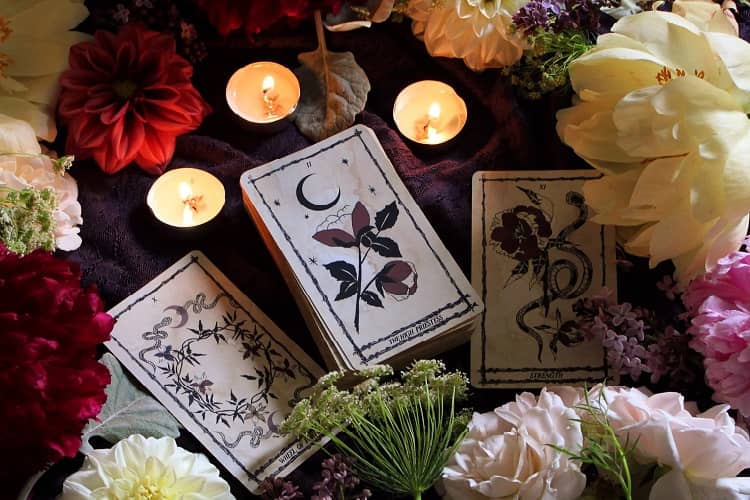
Tarot as a Tool for Self-Reflection: Tarot cards can be seen as a powerful tool for self-reflection. As you engage with the cards, they can serve as a mirror, reflecting your inner thoughts, feelings, and experiences. The images, symbols, and messages within the cards can tap into your subconscious mind, bringing awareness to aspects of yourself that may be hidden or overlooked.
Through tarot, you have the opportunity to explore your emotions, desires, fears, and aspirations. The cards can gently guide you to deeper levels of self-understanding and provide valuable insights into your current circumstances and potential paths forward. By inviting you to contemplate different aspects of your life, tarot encourages personal growth, self-awareness, and a greater connection with your inner wisdom.
Importance of Personal Interpretation: One of the unique aspects of tarot readings is the significance of personal interpretation. While there are established meanings and interpretations for each card, it is essential to remember that the interpretation of a reading is deeply influenced by the individual’s perspective, intuition, and life experiences.
As you lay out the cards and examine their symbols and messages, trust your intuition to guide you in deciphering their meaning. You have a personal relationship with the cards, and your intuitive impressions are vital in unlocking the messages they hold for you. Your interpretations may differ from traditional meanings, and that is perfectly valid. Tarot encourages you to trust yourself and develop your own understanding of the cards based on your unique journey.
Different Approaches to Tarot Card Reading: There are two primary approaches to tarot card reading: intuitive reading and analytical reading.
Intuitive Reading: This approach relies heavily on instinct and personal connection with the cards. With intuitive reading, you allow your gut feelings, impressions, and inner knowing to guide your interpretation of the cards. You may focus on the imagery, symbols, and emotions evoked by the cards, allowing them to speak directly to you without strict adherence to predefined meanings.
Analytical Reading: Analytical reading involves a more structured approach, utilizing established interpretations and traditional meanings of the cards. This approach draws on the collective wisdom and knowledge passed down through generations of tarot practitioners. It may involve consulting guidebooks, studying card symbolism, and employing well-established card spreads to gain insight into various aspects of life.
Both approaches have their merits, and many readers find a blend of intuition and analysis to be most effective. Ultimately, it is up to you to choose the approach that resonates with you the most and supports your personal exploration and growth through tarot.
III. The Role of Rationality
Recognizing the Limitations: It is important to acknowledge that tarot cards have limitations when it comes to predicting specific events or outcomes in one’s life. Tarot readings are not fortune-telling or a means to predict the future with certainty. The cards offer guidance and insight based on the energies and possibilities present at the time of the reading. However, future events are influenced by numerous factors, including personal choices, external circumstances, and the free will of individuals involved. Therefore, it is essential to approach tarot with a realistic understanding that it cannot provide definite answers or guarantee specific outcomes.
Avoiding Overreliance: While tarot can be a valuable tool for self-reflection and guidance, it should not be solely relied upon for making major life decisions. Tarot readings should be seen as a supplementary resource that offers different perspectives and insights. It is crucial to consider other sources of information, such as your own knowledge, experience, advice from trusted individuals, and objective analysis. Ultimately, you are the one responsible for your choices and actions, so it is wise to use tarot readings as a complement rather than as the sole basis for decision-making.
Balancing Intuition with Critical Thinking: When interpreting tarot messages, it is beneficial to incorporate both intuition and critical thinking. While intuition plays a significant role in connecting with the symbolism and deeper meanings of the cards, it is equally important to engage your rational mind. Consider the practical aspects of the situation, weigh the pros and cons, and critically assess the implications of different interpretations. By combining intuition with critical thinking, you can maintain a balanced perspective and make more informed decisions.
Tarot readings can be thought-provoking and provide valuable insights, but it is essential to approach them with an open mind and a healthy dose of skepticism. Remember that you have the power to shape your own life, and tarot serves as a tool to support your journey of self-discovery and personal growth.
IV. Potential Risks and Misconceptions
Overdependency on Tarot: Becoming overly reliant on tarot cards for guidance can have potential dangers. While tarot can provide valuable insights and guidance, relying too heavily on it may hinder personal growth and self-empowerment. Placing all decisions and actions solely in the hands of tarot readings can diminish your ability to take responsibility for your own life. It is important to remember that you have the innate wisdom and capability to make choices and navigate your own path.
Misinterpreting Messages and Psychological Harm: Tarot readings are open to interpretation, and it is crucial to understand that misreading or misapplying the messages can lead to emotional distress or misguided decision-making. Each card holds a range of meanings, and the context of the reading and your personal circumstances must be considered. Misunderstanding the messages or attaching excessive importance to specific interpretations can create unnecessary anxiety or confusion. It is vital to approach tarot with an open mind, accepting that interpretations can be subjective and may require further reflection and exploration.
Guidance vs. Absolute Predictions: It is important to differentiate between tarot cards providing guidance and offering definitive predictions. Tarot should be viewed as a tool for self-reflection rather than a fortune-telling device. The cards offer insights into the energies and possibilities surrounding your current situation, allowing you to gain different perspectives and consider potential paths. However, it is essential to recognize that the future is not set in stone, and outcomes are influenced by numerous variables, including personal choices and external factors. Tarot can guide you in making informed decisions but should not be seen as providing absolute predictions.
By maintaining a balanced perspective and using tarot as a complement to your own intuition and critical thinking, you can avoid overreliance and harness its potential for personal growth and self-empowerment. Remember that you are the ultimate authority in your life, and tarot can serve as a supportive tool in your journey of self-discovery and decision-making.
V. Effective Strategies for Rational Interpretation
1. Rational interpretation
Rational interpretation is crucial in tarot readings as it allows for a logical and analytical approach to deciphering the messages of the cards. It ensures that the interpretations are based on reason, critical thinking, and evidence rather than mere personal biases or subjective opinions. By employing effective strategies for rational interpretation, tarot readers can provide clearer insights and accurate guidance to their clients.
2. Familiarize Yourself
- A. Familiarize Yourself with the Cards To interpret tarot cards rationally, it is essential to have a comprehensive understanding of the symbolism and meanings associated with each card. Take the time to study the traditional interpretations, but also be open to personal interpretations that resonate with you. Additionally, familiarize yourself with different tarot spreads and their specific purposes to choose the most suitable one for each reading.
- B. Contextualize the Reading When interpreting the cards, always consider the question or issue for which the reading is sought. Take into account the surrounding cards and their relationships within the spread. The context provides valuable clues and insights into the overall message of the reading.
3. Logical Analysis
- A. Use Objective Reasoning Approach each card and its placement within the spread objectively. Analyze the individual meanings of the cards without letting personal beliefs or biases influence your interpretation. This ensures a rational and unbiased assessment of the cards.
- B. Look for Patterns and Connections As you analyze the cards, pay attention to any patterns, repetitions, or connections that emerge. Identify recurring themes or symbols that appear throughout the reading. These patterns and connections enhance the depth and accuracy of your interpretation.
- C. Consider Alternative Interpretations While maintaining a logical approach, be open to alternative interpretations of the cards. Tarot is a rich tool with multiple layers of meaning, and there may be various valid interpretations for each card. Consider different perspectives and explore alternative meanings to provide a well-rounded interpretation.
4. Integration with Intuition
- A. Incorporate Intuitive Insights Intuition plays an important role in tarot readings. Allow your intuition to guide you as you interpret the cards alongside logical analysis. Trust your inner wisdom and listen to any intuitive flashes or strong hunches that arise during the reading process.
- B. Trust Your Gut Feelings When your intuition provides a strong indication or feeling about a particular card or aspect of the reading, trust it. Balancing rational analysis with intuition allows for a more holistic and comprehensive interpretation.
5. Seek Validation and Feedback
- A. Consult Tarot Resources To expand your knowledge and understanding of tarot, consult reputable tarot books, websites, or experienced practitioners. These resources can offer valuable insights and different perspectives on interpreting the cards.
- B. Engage in Dialogue Engaging in discussions with fellow tarot readers or seeking feedback from clients can enhance your interpretation skills. Discussing interpretations with others helps broaden your understanding and fosters continuous learning and growth.
6. Reflect and Learn
- A. Review Past Readings Regularly review and analyze your past readings to gain insights into your strengths and areas for improvement. Assess the accuracy and effectiveness of your interpretations, and learn from any mistakes or limitations in your approach.
- B. Continuously Develop Your Tarot Skills To enhance your rational interpretation abilities, practice regularly. Explore different tarot spreads, techniques, and approaches. The more you immerse yourself in tarot, the more confident and proficient you will become in your interpretations.
7. Conclusion
In conclusion, employing effective strategies for rational interpretation in tarot readings is essential to provide accurate and meaningful guidance to clients. By combining logical analysis with intuitive insights and seeking validation and feedback, tarot readers can develop their skills and deliver insightful interpretations. Remember to approach tarot with an open mind and a commitment to continuous learning and improvement. With practice and dedication, rational interpretation in tarot readings can become a powerful tool for personal growth and guidance.
Final Summary:
Tarot cards can be valuable tools for self-exploration and personal guidance when approached with a rational mindset. By understanding their limitations, avoiding overreliance, and balancing intuition with critical thinking, individuals can prevent tarot cards from negatively impacting their lives. Remember, tarot cards offer insights and empowerment when interpreted with wisdom, discernment, and a rational mindset.
Questions about “Tarot Cards Ruin Your Life”
- Can tarot cards bring bad luck or negative energy into my life? Tarot cards themselves do not possess any inherent power to bring bad luck or negative energy. They are simply tools for self-reflection and guidance. How you interpret and engage with tarot cards is what determines their impact on your life.
- Can relying on tarot cards lead to dependency or addiction? While it is possible for some individuals to become overly dependent on tarot readings, it is important to remember that tarot should be used as a tool for self-exploration rather than a crutch for decision-making. Developing a balanced approach and using critical thinking alongside tarot can help prevent dependency or addiction.
- Are tarot cards accurate in predicting the future? Tarot cards are not meant to provide precise predictions of future events. They offer insights and guidance based on your present circumstances and energy. The future is influenced by a multitude of factors, including personal choices, actions, and external circumstances.
- Can tarot readings manipulate or control my life? Tarot readings cannot manipulate or control your life. They offer suggestions and perspectives, but ultimately, you have the power to make your own decisions and shape your own path. Tarot cards should be viewed as a tool to support your own intuition and inner wisdom.
- Can tarot cards reveal personal information without my consent? Tarot cards do not inherently possess the ability to reveal personal information without your consent. They rely on your energy and intention during the reading. A trustworthy tarot reader will respect your boundaries and only explore the topics and areas that you are comfortable discussing.
- Can tarot cards cause psychological harm? Tarot cards themselves do not cause psychological harm. However, misinterpreting or overly fixating on the messages from a reading can potentially lead to emotional distress. It is important to approach tarot readings with an open mind and understand that they are meant to provide guidance, not absolute truths.
- Can tarot readings make decisions for me? Tarot cards should not be solely relied upon to make major life decisions. They can offer valuable insights and perspectives, but it is crucial to combine tarot guidance with critical thinking, personal reflection, and discussing important decisions with trusted friends, family, or professionals.
- Can tarot cards negatively affect relationships or friendships? Tarot cards themselves do not directly impact relationships or friendships. However, the way individuals interpret or communicate their tarot readings can influence these dynamics. It is essential to approach tarot discussions in a respectful and open manner, recognizing that interpretations are subjective and personal.
- Can tarot cards bring about positive changes in my life? Yes, tarot cards can facilitate positive changes by encouraging introspection, self-awareness, and personal growth. They can help you gain new perspectives, uncover hidden aspects of yourself, and inspire you to take proactive steps towards transformation and empowerment.
- Can tarot cards replace professional advice or therapy? Tarot cards should not replace professional advice or therapy. While they can offer insights and guidance, they do not substitute for the expertise of trained professionals. If you require specialized assistance or have concerns about your mental health, it is important to seek appropriate help from qualified professionals.
